Hello, fellow readers! Today, I want to share with you some fascinating information about fruit flies and their appearance. Fruit flies may be tiny pests, but they can cause quite a nuisance in both indoor and outdoor spaces. Let’s dive into the physical characteristics and features that make these little creatures unique.
When it comes to identifying fruit flies, there are a few key visual cues to look out for. Their bodies range in color from tan to brownish, and they have translucent wings that shimmer in the light. One distinct feature is their feathery antennae, which help them navigate their surroundings. And who can miss those large, bright red or black eyes? These stunning eyes are truly a defining characteristic of fruit flies.
But what about their larvae, you might wonder? Well, fruit fly larvae have worm-like bodies and are equipped with small black mouth hooks. It’s interesting to observe their transformation from larvae to adult flies, especially during the harvest season when they often feed on decaying fruits and vegetables.
Key Takeaways:
- Fruit flies have tan to brownish bodies, translucent wings, and large bright red or black eyes.
- Their larvae have worm-like bodies with black mouth hooks.
- Fruit flies can enter homes through open windows or doors and contaminated produce.
- During the harvest season, fruit flies are commonly found feeding on decaying fruits and vegetables.
- Proper identification of fruit flies is essential for effective control and prevention.
The Problem with Fruit Flies and How They Enter Your Home
Fruit flies can quickly become a problem in your home, multiplying rapidly and infesting your living spaces. Understanding how these pests enter your home is key to preventing and controlling their infestation. Fruit flies typically enter homes through open windows, doors, or torn screens. However, one of the main ways fruit flies make their way into your home is through contaminated produce from the store. These insects can lay eggs on fruits and vegetables, which hatch into larvae and develop into adult fruit flies in as little as eight days. A single female fruit fly can lay up to 500 eggs during her lifetime, exacerbating the problem and making it difficult to eliminate the infestation.
To effectively prevent fruit flies from entering your home, it is important to take proactive measures. Keep windows and doors closed, repair any torn screens, and ensure a tight seal on your doors to limit their entry points. When purchasing produce, inspect it thoroughly for signs of infestation, such as eggs or larvae. It is also recommended to store fruits and vegetables in the refrigerator to deter fruit flies from laying eggs on them. By being vigilant and taking these preventive steps, you can reduce the likelihood of a fruit fly problem in your home.

Table: Common Entry Points for Fruit Flies
| Entry Point | Description |
|---|---|
| Open windows | Fruit flies can easily enter through open windows, especially during the warmer months when they are more active. |
| Doors | Leaving doors open for extended periods allows fruit flies to enter your home, particularly if there are ripe fruits or vegetables nearby. |
| Torn screens | Small tears or holes in window or door screens provide easy access for fruit flies to fly into your home. |
| Contaminated produce | Fruit flies can hitch a ride on fruits and vegetables that are already infested, bringing them into your home. |
By understanding how fruit flies enter your home and implementing preventive measures, you can minimize the risk of a fruit fly infestation. Taking these steps not only helps to keep your living spaces clean and pest-free but also ensures the health and well-being of you and your family.
The Dangers of Fruit Flies and How to Prevent Them
Fruit flies may seem harmless, but they can actually pose health risks due to their ability to carry bacteria and other pathogens. When fruit flies land on food or surfaces, they can transfer these harmful microorganisms, potentially leading to food contamination and the spread of diseases.
To prevent fruit fly infestations and protect yourself and your family, it is important to take proactive measures. Here are some key steps you can take:
- Regularly clean and sanitize trashcans: Fruit flies are attracted to decaying organic matter, so it’s crucial to keep your trashcans clean and free from any food residue. Empty and wash the trashcan regularly and ensure it has a tight-fitting lid to prevent fruit flies from accessing the waste.
- Remove trash from the home promptly: Don’t let trash accumulate inside your home. Dispose of it regularly to minimize the availability of food sources for fruit flies.
- Wash dishcloths and sponges frequently: Fruit flies can breed on damp surfaces, so it’s essential to keep your kitchen clean. Regularly wash dishcloths and sponges in hot water and soap to eliminate any potential breeding grounds.
- Clean sink drains: Fruit flies can often breed in the moist environment of sink drains. Regularly clean and sanitize your sink drains using a mixture of vinegar and baking soda to prevent fruit fly infestations.
- Maintain garden areas: If you have a garden, it’s important to keep it well-maintained. Remove any overripe or damaged fruits and vegetables, as these can attract fruit flies. Regularly remove fallen leaves or debris that can provide breeding grounds for these pests.
- Inspect produce: When purchasing fruits and vegetables, inspect them carefully. Avoid buying produce that shows signs of damage or overripeness, as these are more likely to attract fruit flies. If possible, store your produce in a refrigerator to deter fruit flies from infesting them.
- Store fruits and vegetables in the refrigerator: To further prevent fruit fly infestations, store your fruits and vegetables in sealed containers or in the refrigerator. This will help keep them fresh and reduce the risk of attracting fruit flies.
By following these preventive measures, you can significantly reduce the risk of fruit fly infestations and the potential health hazards they can bring. Regularly maintaining cleanliness and implementing proper storage practices will go a long way in keeping your home fruit fly-free and ensuring the safety of your food.
| Preventive Measures | |
|---|---|
| 1 | Regularly clean and sanitize trashcans |
| 2 | Remove trash from the home promptly |
| 3 | Wash dishcloths and sponges frequently |
| 4 | Clean sink drains |
| 5 | Maintain garden areas |
| 6 | Inspect produce |
| 7 | Store fruits and vegetables in the refrigerator |
Getting Rid of Fruit Flies: Effective Control Methods
Fruit flies can be a persistent nuisance, but there are several effective methods for getting rid of them. Here are some tried and tested techniques:
1. Prevention is Key
The first step in eliminating fruit flies is to prevent their entry into your home. Seal any cracks or openings around windows and doors, and ensure that screens are intact and free from tears. Keep doors and windows closed as much as possible, especially during peak fruit fly seasons. Additionally, inspect any fruits or vegetables you bring into your home for signs of infestation.
2. Clean and Remove Attractants
Keep your kitchen and other areas where fruit flies are commonly found clean and free from ripe or decaying fruits and vegetables. Dispose of overripe produce in sealed bags or containers and regularly empty your trash. Clean up spills and crumbs promptly, as fruit flies are attracted to sugary and organic residues. In addition, make sure to clean drains and garbage disposals regularly, as these can be breeding grounds for fruit flies.
3. DIY Traps and Repellents
There are several DIY traps and repellents that can help in controlling fruit flies. One popular method is to create a vinegar trap by placing a mixture of apple cider vinegar and a few drops of dish soap in a jar. The fruit flies are attracted to the scent of vinegar and get trapped in the liquid. Another effective trap is to cover a glass with plastic wrap and poke small holes in it. Fill the glass with a mix of ripe fruit and vinegar. The flies will be attracted to the fruit and vinegar but will have a hard time escaping through the small holes.
While these DIY methods can be effective for small infestations, it’s important to note that they may not completely eliminate a large-scale fruit fly problem. In such cases, it’s best to consult a professional pest control service for accurate identification and targeted control measures.
| Control Method | Description |
|---|---|
| Prevention | Seal openings, inspect produce, and keep areas clean to prevent fruit flies from entering your home. |
| Clean and Remove Attractants | Regularly clean kitchen surfaces, dispose of overripe produce, and clean drains and garbage disposals to remove fruit fly attractants. |
| DIY Traps and Repellents | Create homemade traps using vinegar or ripe fruit to attract and trap fruit flies. |
| Professional Pest Control | For large-scale infestations, consult a professional pest control service for accurate identification and targeted control measures. |
By following these control methods, you can effectively eliminate fruit flies and prevent future infestations in your home.
Understanding Fruit Flies and Gnats: Differences and Characteristics
Fruit flies and gnats are two common types of small flying insects that can be found in homes and outdoor spaces. While they may look similar at first glance, there are distinct differences in their characteristics that can help in identifying them.
Fruit Flies
Fruit flies, as the name suggests, are often associated with ripe or decaying fruits and vegetables. They have oval-shaped bodies with a tan or gray color. One of their key identifying features is their large red or black eyes, which are easily visible. Fruit flies also have translucent wings, which can be seen when they are in flight.
“Fruit flies are commonly found around overripe fruits and vegetables. Their small size and ability to breed quickly make them a nuisance in many homes.”
Gnats
Gnats, on the other hand, have thin black bodies and long, flat legs. They are often found in moist, organic areas such as plants, soil, and decaying matter. While gnats can sometimes be similar in size to fruit flies, their physical appearance and preferred habitats set them apart.
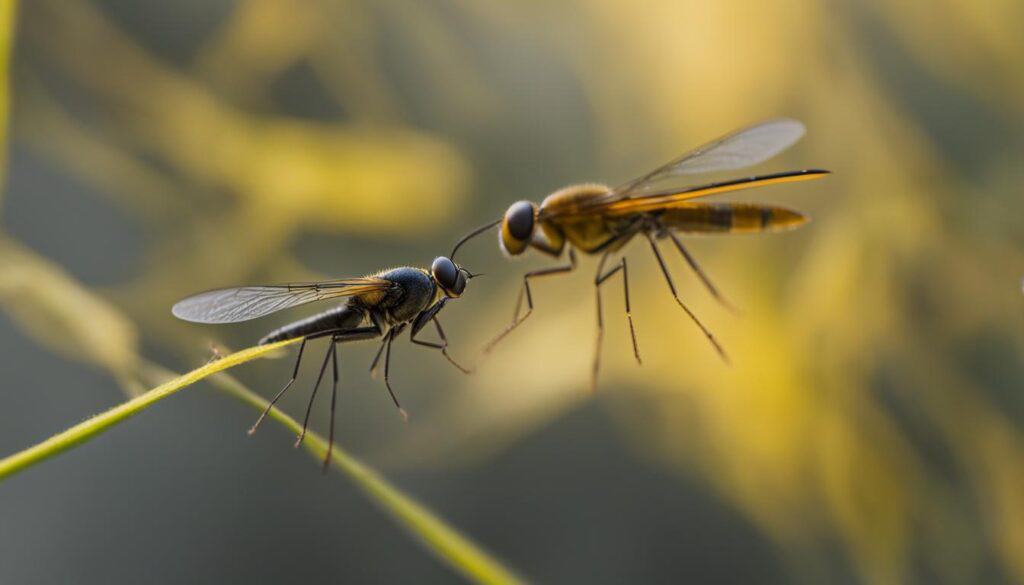
Identification Tips
To differentiate between fruit flies and gnats, it is helpful to consider their physical characteristics and the environments in which they are commonly found. By closely observing their appearance and understanding their preferred habitats, you can identify these flying insects and take appropriate measures for control and prevention.
The Health Risks of Fruit Flies and the Importance of Elimination
Fruit flies may be small, but they can pose significant health risks due to their potential for carrying bacteria and harmful pathogens. These pests can contaminate food and surfaces they land on, leading to the spread of bacterial infections and diseases. It is crucial to prioritize the elimination of fruit fly infestations to maintain a safe and healthy environment.
When fruit flies come into contact with food, they can transfer bacteria such as Salmonella and E. coli. Consuming contaminated food can result in illnesses like salmonellosis and listeriosis, which can cause severe symptoms such as diarrhea, fever, abdominal pain, and in some cases, even hospitalization. Therefore, it is essential to take proactive measures to prevent the spread of diseases associated with fruit flies.
“Fruit flies can carry and transmit bacteria and pathogens on their bodies, making them a potential hazard to human health. By eliminating fruit fly infestations, we can reduce the risk of foodborne illnesses and maintain a safe environment for ourselves and our loved ones.”
Eliminating fruit fly infestations should involve a multi-faceted approach. It is crucial to identify and eliminate the breeding sites of fruit flies, such as decaying fruits and vegetables, as well as ensuring proper sanitation practices in the kitchen and other areas where food is prepared or stored. Regularly cleaning and sanitizing surfaces, storing fruits and vegetables in the refrigerator, and promptly disposing of any rotten produce can help prevent the attraction and proliferation of fruit flies.
If preventive measures do not effectively control the infestation, it may be necessary to seek professional assistance. Pest control experts have the knowledge and expertise to accurately identify the extent of the infestation and implement targeted strategies for eliminating fruit flies. Their intervention can ensure a thorough removal of fruit flies and provide long-term solutions to prevent future outbreaks.
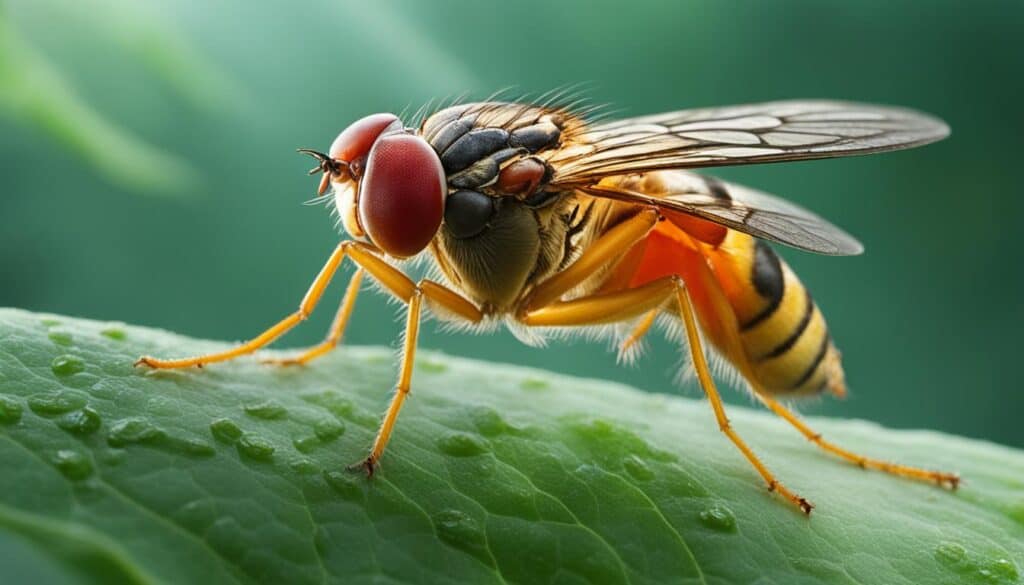
| Health Risks Associated with Fruit Flies | Preventive Measures for Fruit Fly Infestations |
|---|---|
|
|
Importance of Elimination |
Professional Assistance |
| Eliminating fruit flies reduces health risks and prevents the spread of diseases. | If preventive measures fail, professional pest control experts can provide effective solutions for complete elimination. |
Preventing Fruit Fly Infestations: Tips for Proper Food Storage and Hygiene
Fruit fly infestations can be a nuisance, but there are steps you can take to prevent them from invading your home. By implementing proper food storage and hygiene practices, you can reduce the likelihood of fruit flies finding their way into your kitchen and other areas of your house.
Here are some essential tips to help you prevent fruit fly infestations:
- Regularly empty the trash and clean trash cans to eliminate potential food sources for fruit flies.
- Wipe off countertops and tables after preparing or consuming fruits and vegetables.
- Store fresh produce in the refrigerator or in air-tight containers to prevent fruit flies from accessing them.
- Clean drains and garbage disposals regularly to eliminate any organic matter that may attract fruit flies.
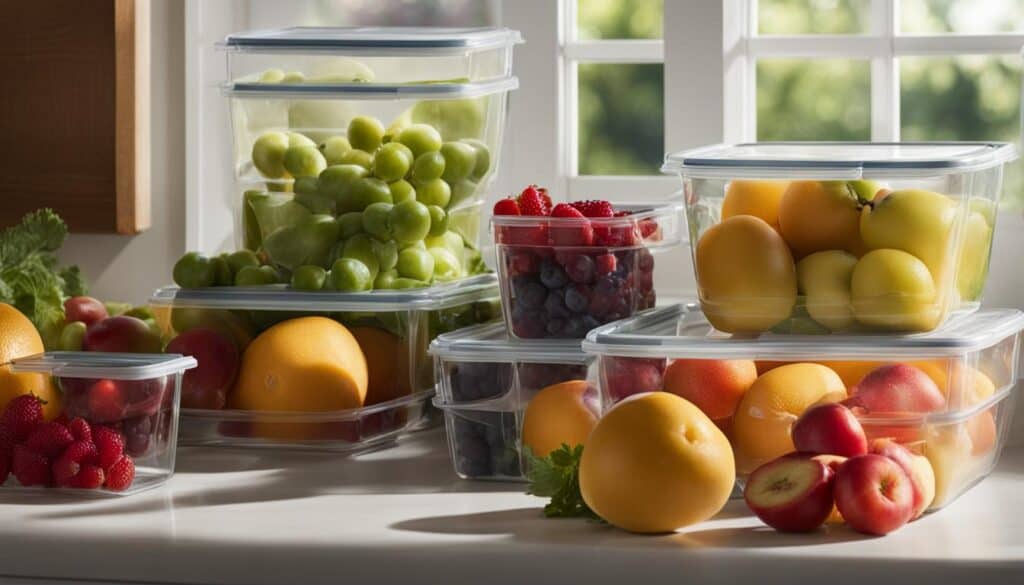
Even with the best preventative measures, fruit flies can still be persistent. If you find that fruit flies continue to be a problem despite your efforts, it may be necessary to seek professional help. Pest control experts have the knowledge and experience to accurately identify the infestation and develop effective control strategies tailored to your specific situation.
Remember, prevention is key when it comes to fruit flies. By implementing these tips and seeking professional help when needed, you can keep your home fruit fly-free and maintain a clean and healthy environment.
When to Call in the Experts: Professional Fruit Fly Control
Although there are several DIY methods available to eliminate fruit flies, sometimes these pesky pests can persist despite our best efforts. In such cases, it is important to consider calling in the experts for professional fruit fly control. Fly control specialists have the knowledge and experience to accurately identify the infestation and develop effective strategies to eliminate fruit flies from your home or business.
By hiring professionals, you can benefit from their expertise in dealing with fruit fly infestations. They will conduct a thorough inspection of the affected areas, pinpoint the source of the infestation, and devise a customized plan of action. Professional pest control services have access to specialized equipment and treatments that are more effective in eradicating fruit flies and preventing their recurrence.
Not only do fruit fly control specialists provide immediate solutions, but they also offer long-term prevention strategies. They can advise you on proper sanitation practices, such as keeping surfaces clean and ensuring proper food storage. Their expertise can help you create an environment that is less attractive to fruit flies, reducing the chances of a future infestation.
Benefits of Professional Fruit Fly Control:
- Accurate identification of the infestation source
- Customized treatment plans tailored to your specific needs
- Access to specialized equipment and treatments
- Efficient eradication of fruit flies
- Long-term prevention strategies
When dealing with a persistent fruit fly problem, it is essential to seek professional assistance. Their expertise and resources will ensure a thorough and effective eradication of the infestation, helping you regain a pest-free environment in your home or business.
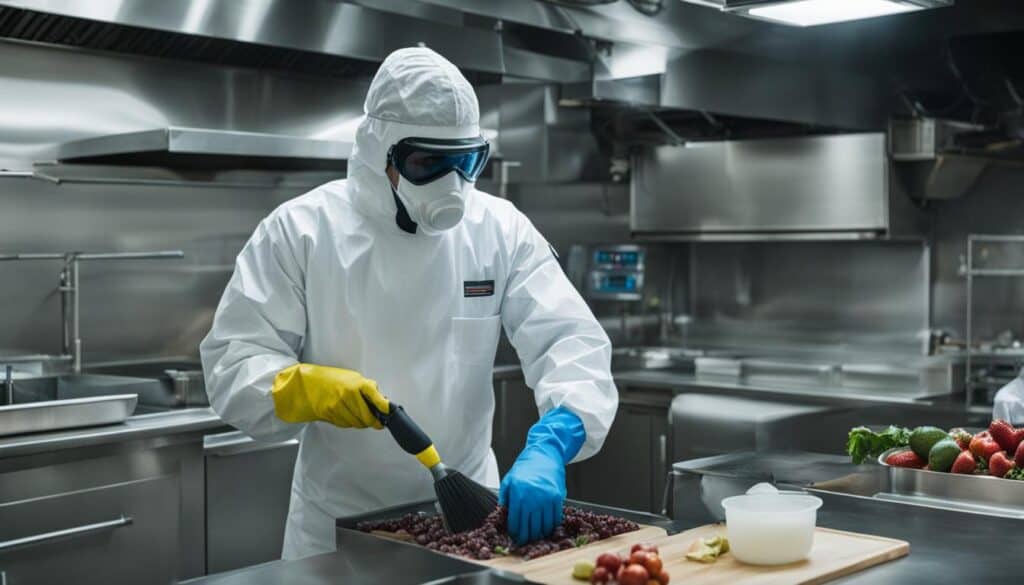
Conclusion
In conclusion, dealing with fruit flies can be a frustrating task. However, by understanding their appearance, behavior, and entry points into our homes, we can take proactive measures to prevent infestations. Regular cleaning and sanitation, proper food storage, and maintaining a clean environment can go a long way in minimizing the risk of fruit fly problems.
While DIY methods can be effective in controlling fruit flies, sometimes it’s necessary to seek professional help. Pest control experts have the knowledge and expertise to accurately identify the infestation, develop customized control strategies, and provide long-term solutions to eliminate fruit flies from your environment.
By taking these steps and remaining vigilant, we can create a pest-free space and safeguard our health and well-being. Remember, prevention is key, and if fruit fly problems persist, don’t hesitate to reach out to professionals who can help you effectively manage and eliminate these pesky insects.
FAQ
Q: What do fruit flies look like?
A: Fruit flies have tan to brownish-colored bodies, translucent wings, feathery antennae, and large bright red or black eyes.
Q: How do fruit flies enter homes?
A: Fruit flies can enter homes through open windows or doors and can also be brought in on contaminated produce from the store.
Q: Are fruit flies dangerous?
A: While fruit flies may not be able to bite or sting, they can carry bacteria and harmful pathogens on their bodies.
Q: How can I prevent fruit fly infestations?
A: To prevent fruit fly problems, it is important to regularly clean and sanitize trashcans, remove trash from the home, wash dishcloths and sponges, clean sink drains, maintain garden areas, inspect produce, and store fruits and vegetables in the refrigerator.
Q: What is the difference between fruit flies and gnats?
A: Fruit flies have oval-shaped bodies with tan or gray color, large red or black eyes, and translucent wings. Gnats, on the other hand, have thin black bodies with long, flat legs.
Q: What diseases can be carried by fruit flies?
A: Fruit flies can potentially spread illnesses such as listeriosis, E. coli infections, and salmonellosis when they contaminate food with bacteria and harmful pathogens.
Q: How can I get rid of fruit flies?
A: It is recommended to seek the help of a professional pest control service for accurate identification and effective control methods. They can develop a customized plan of action to eliminate the infestation.
Q: How can I prevent fruit fly infestations at home?
A: To prevent fruit fly infestations, it is important to maintain proper food storage and hygiene practices, such as regularly emptying the trash, wiping off countertops and tables, storing fresh produce in the refrigerator or air-tight containers, keeping drains and garbage disposals clean, and seeking professional help if fruit flies persist despite preventive measures.
Q: When should I call professional fruit fly control experts?
A: If DIY methods fail to eliminate a fruit fly infestation, it is recommended to call in professional pest control experts. They have the knowledge and experience to accurately identify the infestation, develop effective control strategies, and provide long-term solutions.

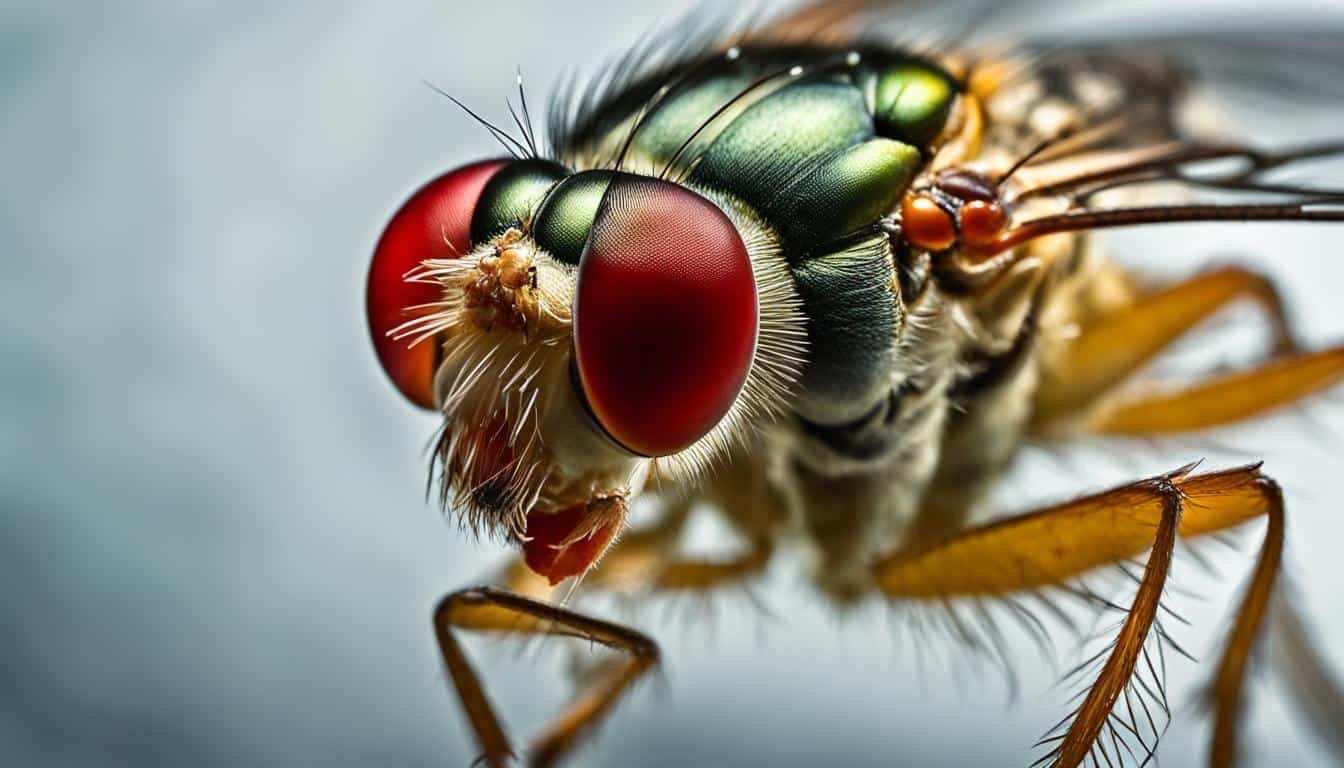



Leave a Reply